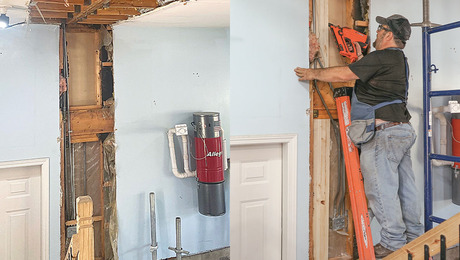I’m going to be starting a project in the spring which involves expanding and developing the second floor of an existing house. Currently, there is one big room and a floor grate which is connected to the forced-air furnace. However, the amount of heat coming up into the room is not enough as it is, and the plans are to develop the space into two-plus rooms and a bath.
So the problem is: what’s the most practical way to provide heat in the new rooms?
I think running new ducts will be hard, since the existing register is in an inconvenient location relative to the new floor plan. Also, as I’ve said, I doubt there would be enough capacity anyway.
The homeowners don’t want to use electric baseboard heaters due to their relatively high cost of operation.
One option that has popped into my head is using a radiator-type system. That way, instead of ducts, we’d be running relatively small pipes through the framing, which is easier to deal with. However, I don’t have any experience with such a system and am really at a square one.
Can anyone make a recommendation for this problem? Does someone have some recent experience with a new radiator-type system? If so, how is it working out, etc.?
Thanks in advance.















Replies
I am assumming that the forced air system is gas fired!
Any other heating method will call for adding another system, i.e., electric or boiler, or a second forced air. A "new radiator type system"(???) usually requires a boiler! ?
I am thinking that A/C will be needed to keep the second floor summer heat moderated, so my suggestion is to install a second gas forced air HVAC on the second floor.
I hope I didn't misinterpret your post....................Iron Helix
What location is the job in (i.e., climate)? That will have a lot to do with the options.
If you only need supplemental heat and no AC, Econo-heaters work great. Super efficient, low energy usage. If you need AC too, how about a ductless heat pump (Sanyo or Mitsubishi)?
This situation might well warrant a few hundred bucks spent with a HVAC engineer.
The house is in Seattle, so there's no need for air conditioning (there's usually only one week a year where the temperatures exceed 90 degrees).
What exactly do you mean by Econo-heaters?
Edited 1/1/2005 4:24 pm ET by ragnar